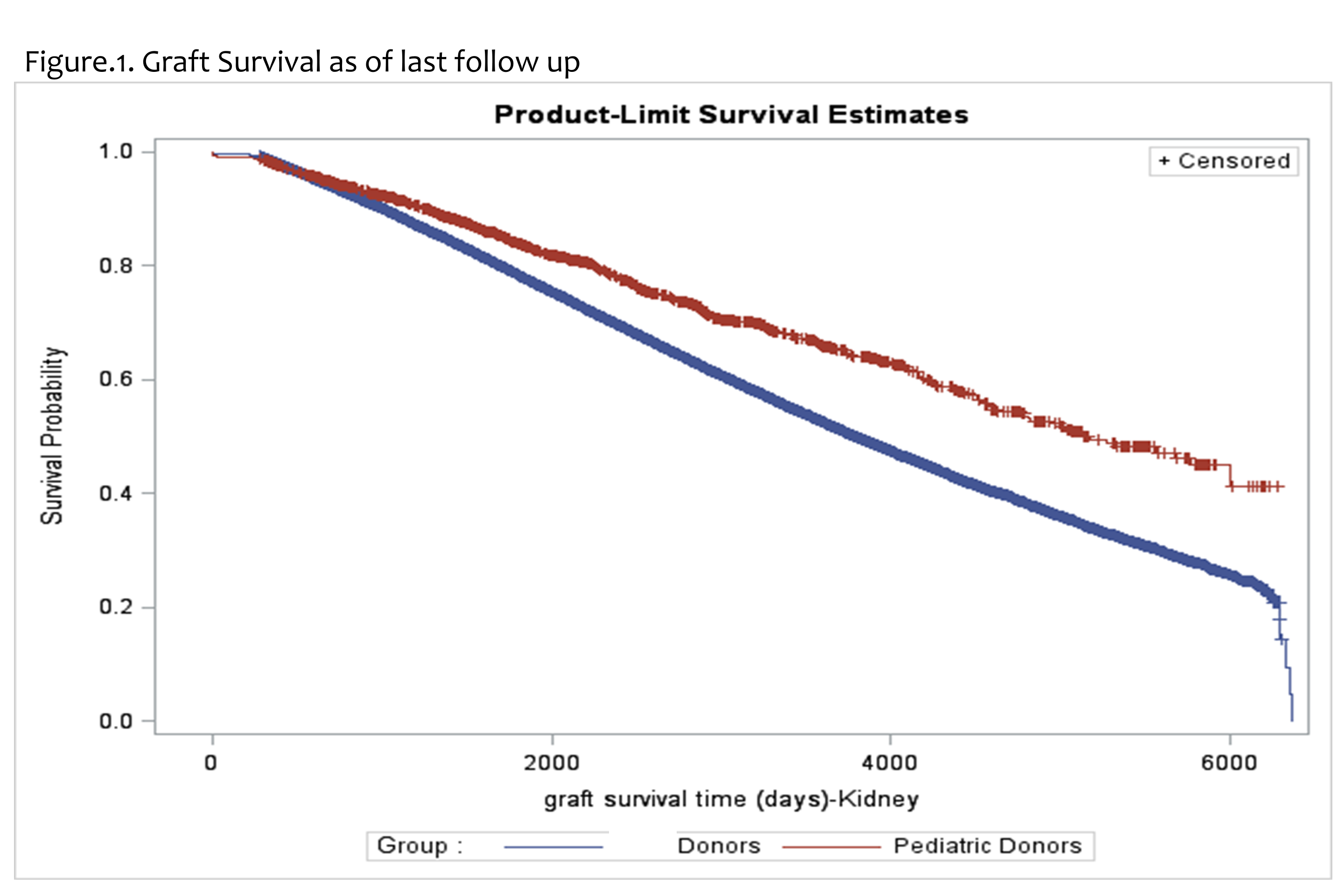Decreased Rejection and Higher Graft Survival in Pediatric Deceased Donors
1Nephrology, University of Kansas Medical Center, Kansas City, KS, 2Statistics, University of Kansas, Kansas City, KS, 3Nephrology, University of Michigan, Ann Arbor, MI
Meeting: 2019 American Transplant Congress
Abstract number: C162
Keywords: Graft survival, Kidney transplantation, Pediatric, Rejection
Session Information
Session Name: Poster Session C: Kidney: Acute Cellular Rejection
Session Type: Poster Session
Date: Monday, June 3, 2019
Session Time: 6:00pm-7:00pm
 Presentation Time: 6:00pm-7:00pm
Presentation Time: 6:00pm-7:00pm
Location: Hall C & D
*Purpose:
Pediatric donor kidneys are important pool of donor kidneys which despite the early surgical complications have good long-term graft survival.1 We hypothesize that this survival advantage could be due to decreased acute rejection (AR) in pediatric vs older donor kidneys. With increasing donor age, an accelerated immune response can be seen especially during the early period of transplantation.2
References:
1.Transplantation. 2006. 82(3):348-53.
2.Am J Transplant. 2012 .12(1):38-42.
*Methods: Using SRTR data, we investigated the difference in AR rates following 1 year of kidney transplantation for the years 2000-2015. Deceased pediatric donors were defined as donors between 0-3 years old.
*Results: Deceased pediatric donor had significantly less rejection as compared to their older counterparts at both 6 and 12 months post-transplant (Table 1). At one-year post-transplant, the adjusted odds of AR was 0.50 (CI 0.43-0.59) when adjusted for significant donor and recipient characteristics on univariate analysis. In addition, AR for donors less than 1 year old had the lowest odds of rejection as compared to other ages although the N was small in this group. Long term graft survival was better in the cohort that received pediatric kidneys (Figure 1).
*Conclusions: Based on our retrospective analysis, a statistically significant lower risk of AR was observed in pediatric vs older donors. Previous reports suggest that with increasing age, more proinflammatory cytokines from ischemic reperfusion injury, higher expression of MHC molecules, compromised phagocytic function of dendritic cells and enhanced endothelial cell activation may contribute to an augmented immune response. These age dependent conditions may explain the decreased AR and better graft survival in pediatric donor kidneys.
|
Characteristics |
Pediatric Donors( <=3ys) (n=2415) |
Donors (>3yrs) (n=109300) |
p-value |
|
Acute Rejection within 1 year (%) |
177 ( 7.3) |
12060 (11.0) |
<0.01 |
|
Acute Rejection within 6 months(%) |
130 ( 5.8) |
9033 ( 8.8) |
<0.01 |
|
Hospital Length of stay post transplant (median [IQR]) |
5.00 [4.00, 7.00] |
6.00 [4.00, 8.00] |
<0.01 |
|
Graft failure at last follow up (%) |
543 (22.5) |
36517 (33.4) |
<0.01 |
|
Patient survival as of last follow up (%) |
2025 (83.9) |
81135 (74.2) |
<0.01 |
To cite this abstract in AMA style:
Budhiraja P, Rotich D, Mahnken J, Ilahe A, Naik A, Cibrik D. Decreased Rejection and Higher Graft Survival in Pediatric Deceased Donors [abstract]. Am J Transplant. 2019; 19 (suppl 3). https://atcmeetingabstracts.com/abstract/decreased-rejection-and-higher-graft-survival-in-pediatric-deceased-donors/. Accessed February 17, 2026.« Back to 2019 American Transplant Congress

